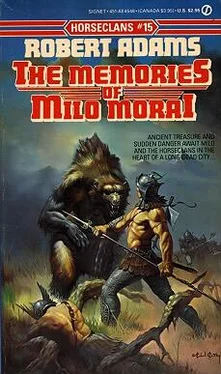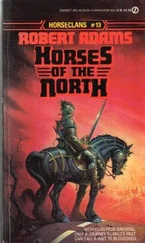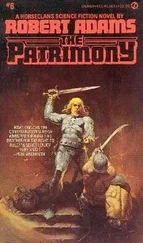“In that regard, at least, you’re in luck, for one of the two clans thatis headed this way boasts the largest herd of cattle of any Horseclan of which I know. I feel certain that Big Djahn, chief of Clan Staiklee, would be delighted to allow your herds to mingle freely with his . . . but be certain to permanently mark your cattle, for he occasionally forgets just which cattle are his and which the property of others. Indeed, it is often remarked among the more southerly-roaming clans that a fair proportion of his herd are ‘previously owned’ cattle.
“But cattle are his only weakness, Wahrn. In all other respects, he is a fine, brave and very honorable man, a chief of note, a war leader of rare talents. Are you to become a Horseclans chief, you might do far worse than to emulate such a man, in all ways save his one, very personal weakness, of course.”
Then Mehrdok asked, “Milo, why did it have to be destroyed, that pleasant, easy world that preceded our own? Why did those uncountable numbers of people have to die so suddenly and so miserably? Can you, with all your long years of life, tell me why?”
“To begin, Wahrn, that now-ancient world was not all of it as easy and pleasant as you have surmised. The great nation that once covered a fair proportion of this continent was perhaps one of the most blessed and prosperous of all that had ever existed, anywhere, but even within it there existed folk who lived hard, meaningless, hand-to-mouth lives, as had their parents before them and as would their children after. Also, during the century preceding the demise of that world, there was never a time when at least one war was not being waged somewhere, in some nation, for some reason or none; for then, as now, the races of mankind were aggressive, predatory and rapacious, and too, in that time and world, there was the problem of too many people and not enough arable land on which to grow food for them all.
“Added to the coveting of other people’s lands was the insatiable desire to dominate all folk, everywhere, which was the driving force of those peoples who called themselves by such names as Communists, Socialists, Fascists, Nazis and the like. These people not only practiced open aggression against other peoples, they also often fomented the lunatic activities of terrorists and revolutionaries in large and small nations all over the world, in the hope that the nations so afflicted would become sufficiently weakened to fall to their arms and armies or to the internal subversion of their hordes of agents within the very governments of target nations.
“All over that old world, Wahrn, folk were leaving the land to crowd in their millions into cities—towns that were miles long and wide—all completely dependent on food, water, fuel and all else being brought from far away and therefore all living within a week or less of starvation and want. In good times, that precarious balance could usually be maintained, but in times of widespread natural disasters, rioting and other civil disorders such as the planned disorders called ‘strikes,’ the chain of supply was sundered and people suffered terribly until it was repaired.
“You see, it was not the so-called war that extir-pated that old world and nearly exterminated all of the races of mankind, but rather the side effects of that hostile exchange, Wahrn. Yes, a very few of the incredibly destructive missiles hurled at the nation that once was here did strike and either destroy their targets or render them uninhabitable for long periods of time. However, the vast majority of those weapons were destroyed in flight, high, high up in the sky, by defenses designed and emplaced for that sole purpose. Yes, tens of millions died in various nations around that world, but earlier wars had been as or almost as costly, and hundreds of millions survived the immediate effects of the missiles, so the world might have picked up the pieces and gone on—an earlier world would have done just that, a world that did not have so many of its people jammed cheek by jowl in un-healthy cities and frightfully vulnerable to contagion, starvation, and the panic bred of unreasoning terror.
“There were those, then, who thought that the plagues were a result of some form of chemical war-fare, and some of them may well have been just that. Who, now, will ever know the truth of the matter? But I have always been of the opinion that they were simply new mutations of older plagues, for they moved around the vast expanses of that old world with almost unbelievable rapidity, took hold and slaughtered in areas that had not been attacked by anyone, that still were well fed, living in peace and order.
“The selectivity of those plagues was very puzzling, though, Wahrn. Races that were completely wiped out in some parts of the world were the sole survivors in others. In a few places, women and children and old people were the first to die, the adult men not succumbing until months later, while other scattered localities suffered just the reverse.
“Those plagues did their fair share and more of killing of prideful mankind, but they were not the only killers then stalking about; no, starvation took terrible toll, and other more mundane diseases and injuries cost innumerable lives due to a dearth of medicines and those trained in the use of them. Others died in flareups of warfare that went on as long as there were enough fighters to field and weapons with which to arm them. And even after the national or ethnic armies were become a thing of the dead past, packs of well-armed scavengers made life exceedingly miserable for those survivors they did not kill outright, when they had done robbing and raping them. So long as any sort of order, of governmental authority, existed, attempts were made to keep these packs of scavengers and looters away from as many places as possible with such few police and military personnel as remained; I would surmise that your ancestors were just such a force, sent here to protect the people then living here from the roving gangs of spoilers.
“I ran into just such a group, a unit of the California State Guard, on just such a mission, early on in the death of the old world. Not knowing just who I was or what I was about and assuming the worst, they shot me and left me for dead . . . which is just what any normal man would have soon been. I’ve never faulted them for it—they were trying to follow their orders, to do a hard, in the end an impossible, job the best they knew how to do it, and after sixty days of living off the land in the Sierra, I’m certain that I looked as wild and as woolly as anyone they had come across up until then. I played the part of a good corpse until that unit had moved on out of sight, then went on about my business.
“A few days after that incident, I lucked across an isolated, very affluent home hidden away in a small canyon in the foothills. None of the people who had lived there had been dead long, and I dragged their bodies out and buried them, then moved in. That dead family had apparently believed in preparing for any eventuality and had clearly been sufficiently affluent to prepare thoroughly, in depth.
“The home was far larger than it looked, more comfortable and richly appointed inside than the outside would lead anyone to believe. Behind the house itself was an underground garage housing three all-terrain vehicles, a well-equipped shop facility, a good-sized gasoline-powered auxiliary electrical generator and an access corridor to the cellar of the house.
“The deceased owners of the place had laid in enough high-quality foodstuffs to have fed a score of men for six months, the water was electrically pumped from an artesian well and the gasoline to power everything was contained in a buried five-thousand-gallon tank. But the reason I stayed there as long as I did was really the elaborate and very powerful short-wave radio. It’s because of the couple of months I used that radio that I know as much as I do about what occurred in the rest of the world, long ago, that and my abilities to speak and comprehend a large number of the languages then used.
Читать дальше












